Family-run restaurant Dimitri’s has delighted Manchester diners for 28 years – so what’s its secret?
- Written by Louise Rhind-Tutt
- Last updated 6 years ago
- City of Manchester, Food & Drink, Sponsored
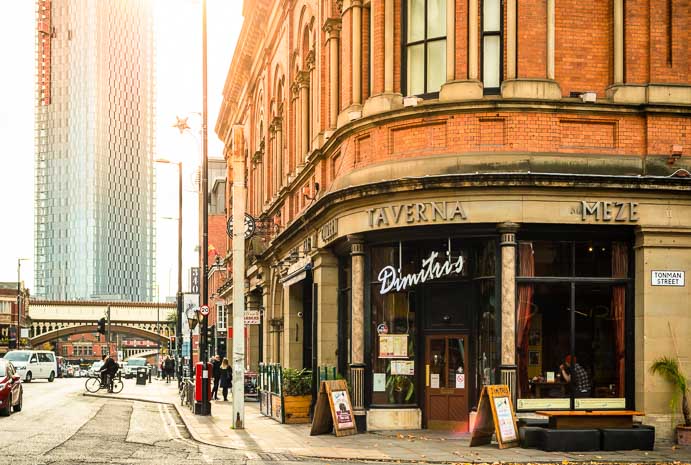
Manchester’s food scene has changed a lot over the past quarter of a century. There’s infinitely more choice, and people are dining out more than ever.
Restaurants have come and gone, but one is still going strong. Dimitri’s, a family-run Greek restaurant on Deansgate, has been part of the city’s food scene for an impressive 28 years.
“It started as a small deli, but it has grown with the city,” says Dimitri’s general manager Nuno Luz.
“As Manchester got bigger, we got bigger. We have been through all the good times and bad times with Manchester. But we’re still here, still fighting.”
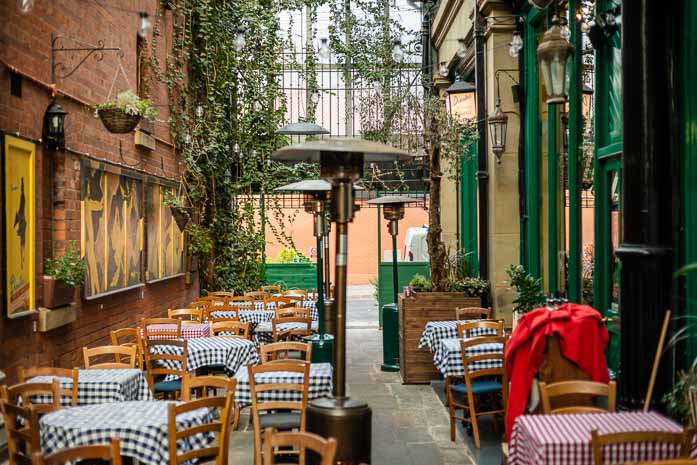
The restaurant has expanded over the decades from a single unit to the five it now occupies in Campfield Arcade, and is capable of accommodating up to 300 diners. An outdoor arcade allows for alfresco dining – even if there’s a chill in the air, thanks to the heaters.
Hospitality can be a precarious business. So what’s the secret to their longevity?
“We try to be a relaxed restaurant, inclusive, for everyone and every age,” says Nuno. “We’re not formal. People come to have different kinds of experiences, whether it’s with their family or as a romantic night to sit outside.”
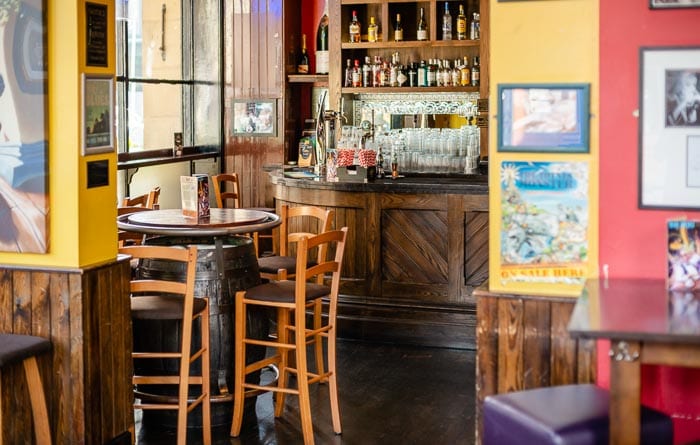
The food is also key, of course, and Dimitri’s prides itself on its relaxed, authentic dishes. “It’s primarily Greek, because Dimitri is Greek, but we also include other Mediterranean countries like Spain, Italy, some of the Balkan area,” says Nuno.
A pioneer of the small plates trend which is now ubiquitous across the city, Dimitri was inspired to open his restaurant after his uncle took him to a Greek mezze bar as a youngster.
The vibe is more country kitchen than haute cuisine, says Nuno – and that’s what customers keep going back for. It’s like reliving your summer holiday in Greece, but much closer to home.
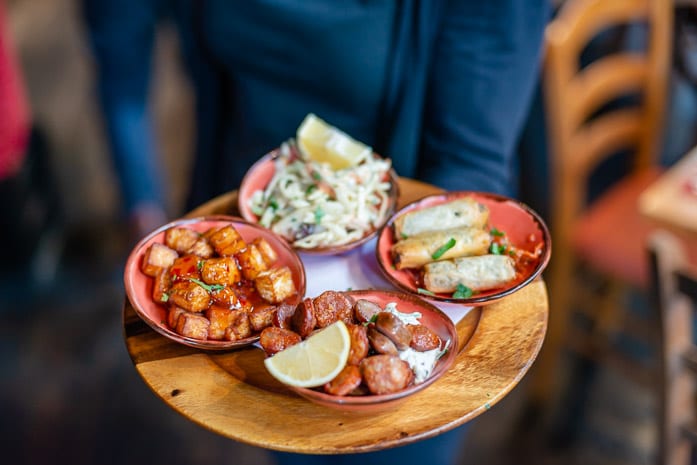
“There is a lot of variety in terms of flavours and tastes and textures, and we were one of the first restaurants to have a lot of vegetarian options,” explains Nuno.
Dishes include marinated lamb kebabs and chargrilled meat, fish and vegetables as well as salads and tagines. Some of the dishes on the menu are classics – and some have been around since the early days of the restaurant, almost three decades ago.
“The grilled halloumi has been here forever,” says Nuno. “And traditional dishes like the moussaka and the stifado.”
That’s not to say they don’t sometimes invent new dishes, though – and fuse Greek classics with the best of British.
Take Stifado in the Hole, for instance. It’s traditional slow-cooked Greek beef, onions and red wine stew, but served in a Yorkshire pudding with green beans and patatas or fries. The new dish has only been on the menu a few weeks.
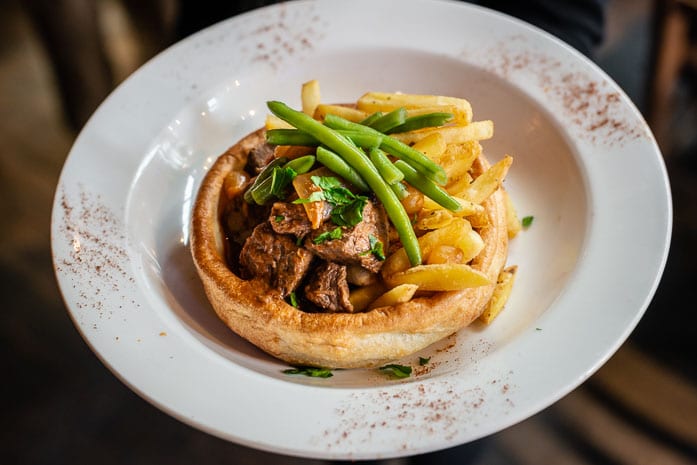
“The Yorkshire pudding stifado came about when we were thinking of new things for the lunch menu,” says Nuno.
“We thought it could be good to incorporate a British style to it. Every so often I try something a bit unusual like that. We mix traditions from British culture and Greek culture. When we change the menu, people give us feedback, and that’s good. It helps us evolve.”
The flexible dining experience is also something that keeps customers returning.
“We have survived mainly thanks to regular customers. But sometimes we get people coming and they’ve never been here before,” says Nuno.
“You can order a couple of dishes and then add to it. It’s not rigid. And it invites people to experiment and try new things.”
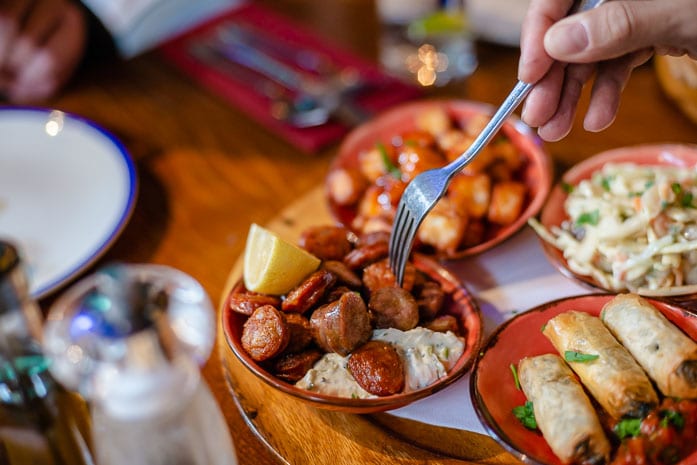
The restaurant is thriving thanks to its regular customers. And regular really does mean regular.
“Manchester is getting bigger, and there are so many restaurants now,” says Nuno. “People are experimenting and going to different places to eat out. There are still people out there who have not tried us.
“But we have lots of regulars, and not just people who come once a month but people who really do come regularly. Maybe three or four times a month.”
Manchester has been a welcoming home for the restaurant for nearly three decades now. So hat does Nuno love most about the city?
“Manchester is warm,” he says. “A warm city in a cold place. It’s so welcoming. Northern warmth. I hope it never loses it.”
- This article was last updated 6 years ago.
- It was first published on 7 November 2018 and is subject to be updated from time to time. Please refresh or return to see the latest version.
Did we miss something? Let us know: [email protected]
Want to be the first to receive all the latest news stories, what’s on and events from the heart of Manchester? Sign up here.
Manchester is a successful city, but many people suffer. I Love Manchester helps raise awareness and funds to help improve the lives and prospects of people across Greater Manchester – and we can’t do it without your help. So please support us with what you can so we can continue to spread the love. Thank you in advance!
An email you’ll love. Subscribe to our newsletter to get the latest news stories delivered direct to your inbox.
Got a story worth sharing?
What’s the story? We are all ears when it comes to positive news and inspiring stories. You can send story ideas to [email protected]
While we can’t guarantee to publish everything, we will always consider any enquiry or idea that promotes:
- Independent new openings
- Human interest
- Not-for-profit organisations
- Community Interest Companies (CiCs) and projects
- Charities and charitable initiatives
- Affordability and offers saving people over 20%
For anything else, don’t hesitate to get in touch with us about advertorials (from £350+VAT) and advertising opportunities: [email protected]


Gyms are failing deaf people – but this company is planning to fix it

The world-renowned Mancunian architect behind Old Trafford’s future

Manchester United reveal plans for new 100,000-seater stadium – set to be UK’s biggest

Review: RNCM Session Orchestra with Tim Burgess and Helen O’Hara is ‘a joyful evening of classics’
















